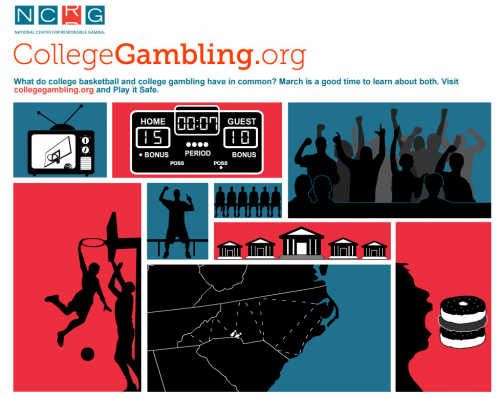How many people have a gambling problem? That is the simple question posed by prevalence studies on gambling disorders. However, media reports and scientific articles reveal that this is not a simple issue. This Gambling Disorders 360˚ post is the first in a series called “Gambling Disorders Explained.” We are including these types of posts to help simplify and increase understanding of the different types of studies that exist about gambling disorders, as well as explain contributing factors to various research outcomes about this disorder.
First, if you’re confused by the many terms used to describe gambling addiction, you’re not alone. These labels include “problem gambling,” “pathological gambling,” “compulsive gambling,” “gambling addiction,” “at-risk gambling,” “low risk gambling” and “probable pathological gambling.” One reason for the variety of terms is the multiplicity of screening instruments such as, to name just a few, the SOGS and the NODS (Lesieur & Blume, 1987; Gerstein, 1999). All use their own unique terms. Many of these screens utilize a category, often called “problem gambling,” to identify people who are having some problems as a result of their gambling but do not meet diagnostic criteria for pathological gambling, the most severe form of the disorder.
It is important to note that the diagnosis for pathological gambling in the American Psychiatric Association’sDiagnostic and Statistical Manual of Mental Health Disorders(DSM) does not provide a subclinical or problem gambling category (American Psychiatric Association, 1994). In other words, the person either meets five or more of the 10 criteria for a diagnosis of pathological gambling or does not. Consequently, neither the current DSM-IV diagnosis nor the proposed DSM-5’s designation for the new term “gambling disorder,” provide any guidance for the threshold for subclinical gambling. The proposed shift from “pathological gambling” to “gambling disorder” addresses the frequent complaint that “pathological gambling” is a pejorative term that only serves to reinforce a highly stigmatized disorder (American Psychiatric Association, 2011).
Another source of confusion when it comes to determining how many people have a gambling problem is the fact that scientists and the media often lump together the prevalence rate for subclinical or problem gambling and pathological gambling when talking about the issue. This can be confusing because research has shown that these two numbers are distinct, and if they are combined, it misrepresents the facts. In fact, approximately less than one percent of the adult population is diagnosed with pathological gambling and 2.3 percent is shown to have a subclinical or problem gambling diagnosis (Kessler et al., 2008).
Combining the problem gambling and pathological gambling prevalence rates can also be misleading because there is a lack of consensus in the field about the meaning of “subclinical.” Many maintain that this group is at risk and that since pathological gambling is a “progressive” disorder as defined by the DSM, subclinical gambling problems will likely develop a full blown disorder. However, other investigators have observed a more dynamic phenomenon and concluded that many people move back to a healthy state from a subclinical status (Slutske at al., 2003; Shaffer et al. 2002).
It also is often unclear whether the media is reporting past-year or lifetime prevalence rates in its stories. Lifetime rates of prevalence are always higher because they include cases of gambling disorders that have since resolved. Studying lifetime rates is important if investigators are analyzing issues such as age of onset (e.g., Kessler et al., 2008). On the other hand, past-year rates are vital for answering the question, how many people have the disorder now? Past-year rates are vital for public health planners who need to deal with the here and now in their work.
Ultimately, it is important for researchers, media and those who are keenly interested in this topic to be precise in how they define and talk about gambling disorders and the rates of those who are affected with the psychological problem. That is why it’s important to examine the most recent peer reviewed studies. Resources such asTHE WAGERand Gambling Disorders 360 ° are a quick and easy way to stay informed.
Another source of confusion is the difference between prevalence and incidence studies. This topic will be covered in an upcoming blog post for this series.
Do you have questions or comments about the concepts discussed in this blog? Is there another aspect of research on gambling disorders that you would like to have explained in a Gambling Disorders 360˚ post? Please submit your suggestions in the comments section below.
References
American Psychiatric Association. (1994).DSM-IV: Diagnostic and Statistical Manual of Mental Disorders(Fourth ed.). Washington, DC: American Psychiatric Association.
American Psychiatric Association. (2011). DSM-V: The Future of Psychiatric Diagnosis. Retrieved August 23, 2011, from www.dsm5.org
Gerstein, D., Murphy, S., Toce, M., Hoffmann, J., Palmer, A., Johnson, R., et al. (1999).Gambling Impact and Behavior Study: Report to the National Gambling Impact Study Commission. Chicago: National Opinion Research Center.
Kessler, R. C., Hwang, I., LaBrie, R., Petukhova, M., Sampson, N. A., Winters, K. C., et al. (2008). DSM-IV pathological gambling in the National Comorbidity Survey Replication.Psychological Medicine, 38(9), 1351-1360.
Lesieur, H. R., & Blume, S. B. (1987). The South Oaks Gambling Screen (SOGS): A new instrument for the identification of pathological gamblers.American Journal of Psychiatry, 144(9), 1184-1188.
Shaffer, H. J., & Hall, M. N. (2002). The natural history of gambling and drinking problems among casino employees.Journal of Social Psychology, 142(4), 405-424.
Slutske, W. S., Jackson, K. M., & Sher, K. J. (2003). The natural history of problem gambling from age 18 to 29.Journal of Abnormal Psychology, 112(2), 263-274.
NCRG staffResearch Updategambling disordersgambling disorders explainedresearchresponsible gaming


